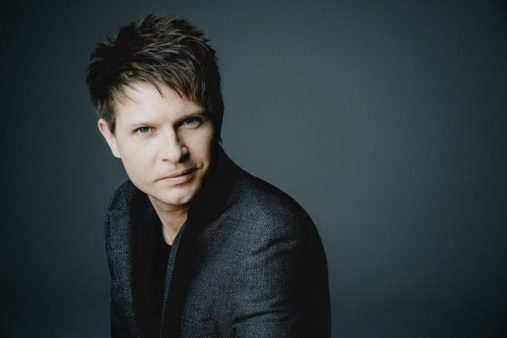Between the Poles: Urbanski leads Dallas Symphony in Kilar’s graceful “Orawa”

Krzysztof Urbanski paid tribute to a celebrated countryman, Wojciech Kilar. Photo: Marco Borggreve
Thursday night’s concert of the Dallas Symphony Orchestra at Meyerson Symphony Center had a heavy Slavic flavor, with works of Chopin, Dvořák, and Wojciech Kilar on a program featuring guest conductor Krzysztof Urbanski and guest pianist Jan Lisiecki.
Polish native Kilar, who died in 2013, produced a huge body of film scores, including music for Bram Stoker’s Dracula and The Pianist, as well as an equally substantial body of classical concert music; his Orawa of 1988, which opened the concert, has already claimed a permanent place in the symphonic repertoire. A nine-minute tone poem inspired by the mountainous Polish southern border region, Orawa opens with minimalist textures that gradually expand to a broad, muscular climax.
Polish-born conductor Urbanski, whose main current gig is as music director of the Indianapolis Symphony Orchestra, guided the orchestra through an efficiently energetic and detailed reading of his compatriot’s music. Urbanski at the podium was elegantly on-point, without affectation or visual histrionics, while the rich and precise tone of the Dallas Symphony lent itself well to Kilar’s sonorous harmonics.
The second item on the program, Chopin’s Piano Concerto No. 2, is a glitteringly pretty but ultimately second-rate work by a first-rank composer: A central Larghetto offering glimpses of Chopin’s mature genius is flanked by outer movements wallowing in showy scales and passage-work. It doesn’t help that Chopin, though gifted with a miraculous knack for piano sonorities, just wasn’t interested in orchestration. The result is a fairly mundane backdrop for all that gesticular piano.
Pianist Lisiecki, the Canadian-born son of Polish parents, brought a gorgeous tone and brilliant technique to this problematic score, along with a sure ear for the tuneful qualities and occasional arresting moments in the work. After a shaky entrance on the opening phrase, conductor Urbanski made the most of the orchestra part to provide a solid foundation for Lisiecki’s fireworks.
Because of its immense popularity, it’s almost easy to overlook the admirable qualities of Dvořák’s Ninth Symphony, “From the New World.” Dvořák’s combined mastery of structure and romanticism, at full force here, shined through in Urbanski’s laser-focus on fine points and his feel for the first movement’s grandeur.
English hornist David Matthews gave a calmly lyrical reading of that all-too famous, longingly nostalgic principal tune of the Largo. Conductor Urbanski brought a breathtaking aura of mystery to the movement’s middle section. And Urbanski nurtured Dvořák’s subtle counterpoint throughout, nicely filling out the stormy mood of the third movement, leading into the alternating majesty and ecstasy of the Finale before lingering dramatically on the slowly fading final note.
The program will be repeated at 7:30 p.m. Friday and Saturday at Morton H. Meyerson Symphony Center. mydso.com; 214-692-0203.